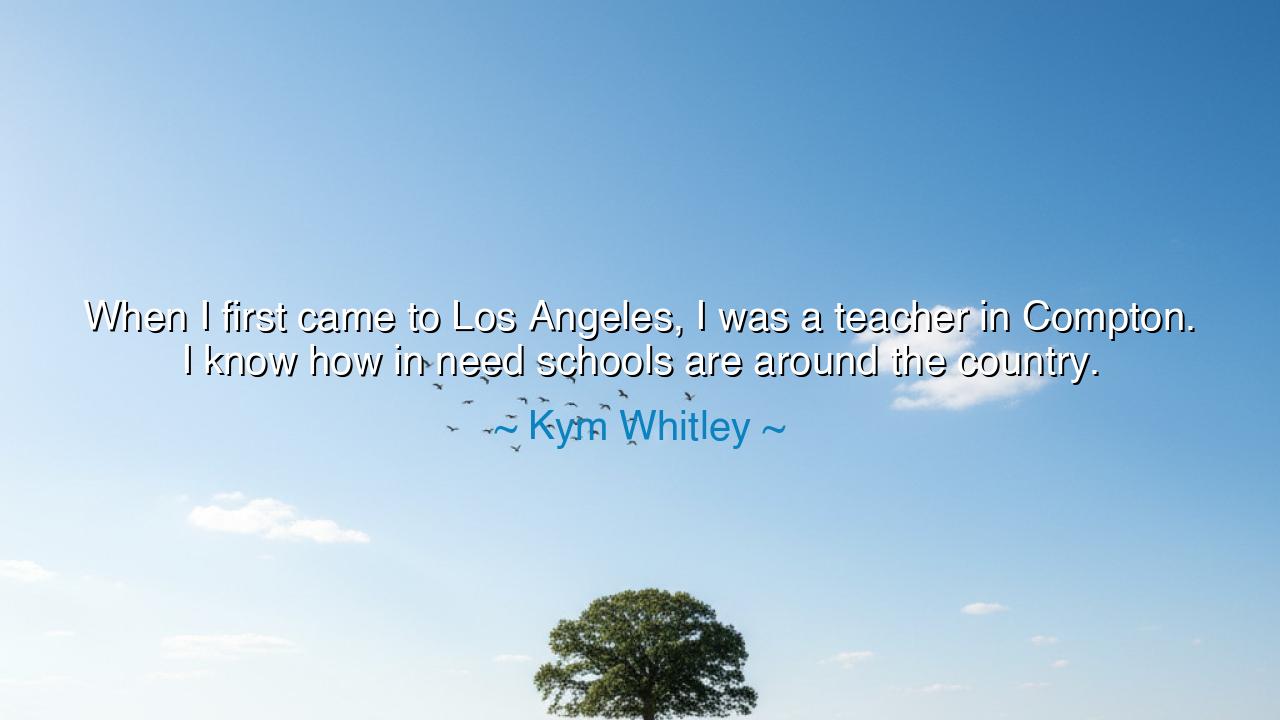
When I first came to Los Angeles, I was a teacher in Compton. I
When I first came to Los Angeles, I was a teacher in Compton. I know how in need schools are around the country.






Kym Whitley, with honesty drawn from lived experience, once declared: “When I first came to Los Angeles, I was a teacher in Compton. I know how in need schools are around the country.” These words are not merely a reflection of her past, but a testimony to the hidden struggles within classrooms that too often go unseen. They reveal the truth that beneath the glitter of cities and the ambitions of individuals lies the daily reality of teachers and students, striving against scarcity, fighting for opportunity, and yearning for a fair chance at growth.
The meaning of her reflection is anchored in the recognition of need. To teach in Compton — a place known not only for its resilience but also for its challenges — is to see firsthand the lack of resources, the weight borne by children and educators alike, and the determination to move forward despite obstacles. Whitley’s words remind us that schools are not mere buildings; they are battlegrounds where the future of a nation is fought for, and where victory is often hindered by shortages of books, supplies, funding, and support.
The origin of such a truth rests in the sacred role of education throughout history. From the ancient academies of Athens to the one-room schoolhouses of the American frontier, societies have known that education is the seed of civilization. And yet, time and again, the weakest and poorest communities are those where education is most neglected. Whitley’s words echo the ancient wisdom that where schools are starved, the spirit of a people is diminished, and where schools are nourished, a nation flourishes.
History bears witness to this. Consider the story of Booker T. Washington, who, born into slavery, built the Tuskegee Institute to lift generations of African Americans into dignity and skill through education. He saw, as Whitley did, that schools were in desperate need — not only of books and money, but of belief in their transformative power. Or recall Malala Yousafzai, who risked her life to cry out against the denial of education for girls, declaring that one teacher and one book could change the world. These examples show that scarcity in schools is not unique to Compton, but is a global wound.
Whitley’s words also reveal a profound empathy. Though her path carried her from teaching into the world of entertainment, she did not forget the truth she witnessed in those early classrooms. To know the need of schools is to carry an awareness that transcends personal ambition. It is to see that the true wealth of a nation is not in its gold or monuments, but in the minds of its children — and when those minds are neglected, the nation itself is imperiled.
The lesson for future generations is plain yet urgent: to honor teachers and to strengthen schools is not charity, but duty. A society that allows its schools to languish in need condemns itself to poverty of spirit and weakness of future. But a society that invests in its schools builds pillars of strength that endure for centuries. For no empire, no kingdom, no republic has ever outlived the collapse of its education.
Practical actions must follow. Support schools not only with words but with resources. Volunteer your time, mentor the young, and give where there is lack. Demand from leaders that education be placed at the heart of national priority. Parents, teachers, and citizens alike must labor together, remembering that every child deserves the tools to flourish. And those who have walked new paths — like Whitley — must speak of the needs they witnessed, so that silence does not cover neglect.
Thus, Kym Whitley’s memory becomes more than a personal story; it is a warning and a charge. She teaches us that behind every star, every leader, every builder of tomorrow, there once stood a classroom — sometimes rich, sometimes impoverished — where their future was shaped. To ignore the needs of schools is to starve the roots of tomorrow; to meet them with courage and generosity is to ensure that the tree of humanity continues to rise, strong and unbroken, into the sky.






AAdministratorAdministrator
Welcome, honored guests. Please leave a comment, we will respond soon